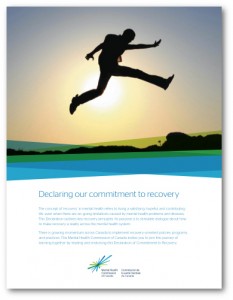 Earlier this week, the Mental Health Commission of Canada (MHCC) hosted an eastern Canada regional dialogue to discuss their draft Guidelines for Recovery-Oriented Practice. Participants came from as far away as Newfoundland and Labrador and had lively discussion on the history of the consumer/survivor movement, how to define recovery and ways to implement the guideline in the future. The final guidelines will be released by the end of May, 2015. Representatives from CMHA Ontario, CMHA Prince Edward Island and Mind Your Mind were among those in attendance from the mental health sector, along with people with lived experience (PWLE). The meeting provided space for small and large group discussions and resulted in several recommendations for the MHCC, including:
Earlier this week, the Mental Health Commission of Canada (MHCC) hosted an eastern Canada regional dialogue to discuss their draft Guidelines for Recovery-Oriented Practice. Participants came from as far away as Newfoundland and Labrador and had lively discussion on the history of the consumer/survivor movement, how to define recovery and ways to implement the guideline in the future. The final guidelines will be released by the end of May, 2015. Representatives from CMHA Ontario, CMHA Prince Edward Island and Mind Your Mind were among those in attendance from the mental health sector, along with people with lived experience (PWLE). The meeting provided space for small and large group discussions and resulted in several recommendations for the MHCC, including:
- Include a preface to the guideline recognizing the purpose and history of the consumer/survivor movement.
- Highlight stories of recovery to inspire practitioners, PWLE and the general public.
- Co-design implementation and evaluation plans by including practitioners and PWLE.
- Address the mental health and recovery of practitioners as well.
- Disseminate the guidelines using different media (e.g. infographic, social media) to reach a wider variety of audiences.
In support of this work, the MHCC has already released a declaration emphasizing their commitment to working with all stakeholders to improve recovery-oriented services in Canada. Individuals and organization can endorse the declaration to raise awareness and show commitment to this cause. To sign the declaration, visit the MHCC website.
The MHCC has also launched a Recovery Inventory that offers a variety of recover-oriented policies, practices, programs and research as well as individual stories. There is no criteria for being included in the inventory and organizations and individuals are encourage to contribute to it. To search or submit a resource to the recovery inventory, view the inventory on the MHCC website.
To find out more about the MHCC’s work on recovery, visit the MHCC website.